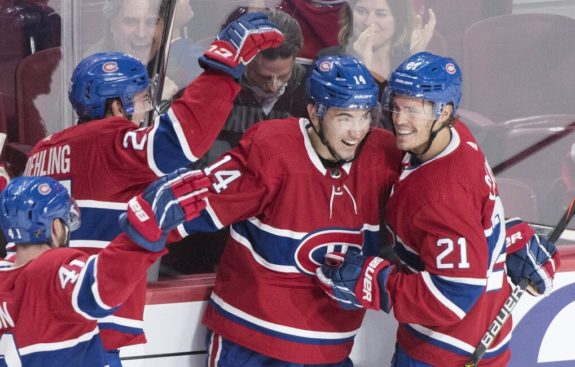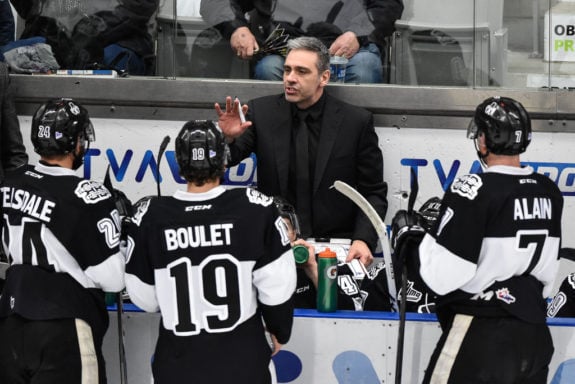When the Montreal Canadiens traded away Max Pacioretty as part of their retooling phase, there was no doubt that Nick Suzuki was the key in the return package. Coming out of the 2017 draft as the 13th overall selection, Suzuki impressed scouts with his hockey sense in combination with his passing and puck control. They were attributes that continued to shine during his development camps.
Regardless of Suzuki’s impressive junior career, since he has moved on to professional status, a good question to ask is whether he should continue in the NHL, or in the American Hockey League. Despite currently coming along over his last five games, the Canadiens need to keep his long-term development in mind.
Inevitable Ups and Downs
Suzuki’s strong performance during this preseason earned him a spot with the Canadiens to begin the regular season. Keeping in mind that he played the majority of his preseason as a centre, he displayed very strong shot attempt percentages in his five games. He also had a good mind for defensive play, something that was a bonus for the coaching staff.

With teams around the league rounding up their rosters in their respective final preseason games, the Canadiens put Suzuki on the right wing, where he has remained so far. He began the season in a higher position in the depth chart, playing with Max Domi and Artturi Lehkonen. Unfortunately, Suzuki did not seem as comfortable as he did during the preseason as the intensity of play increased in the regular season. This caused him to go between second- and fourth-line duties throughout his first few regular-season games.
As of the Canadiens’ game against the St. Louis Blues in mid-October, Suzuki began to play much more often on the bottom line alongside centre Nate Thompson and a rotation of left-wingers. At first glance, this may have had the perception of being detrimental to his development. However, things actually turned around for Suzuki since then, with three goals in his last five games.
A Fourth Line That Works
Playing on the right of the fourth line, Suzuki began seeing better matchups. It was part of an effort by the coaching staff to shelter a player still learning to adapt to the pros (from “Stu Cowan: Habs’ Claude Julien makes effort to shelter Nick Suzuki,” Montreal Gazette – 10/16/19). Therefore although he is receiving less even-strength ice time against generally easier matchups, Suzuki has had more space and opportunity to learn the more meticulous details of the game without costing the team chances to win.
Playing with Thompson seems to be aiding him greatly in that regard as well. Thompson has been guiding Suzuki in aspects of the game such as how to react after faceoffs, defensive-zone coverage and breakouts (from “Canadiens’ ‘Uncle Nate’ plays key role in Nick Suzuki’s development,” Montreal Gazette – 10/28/19).

Suzuki has also continued receiving time on the power-play, often playing on the same unit as Domi and Tomas Tatar. Although he only has one power-play assist, his unit scored seven out of the team’s total of 10 (via Natural Stat Trick).
Therefore it’s clear that Suzuki is earning some valuable experience in his current situation. However, would he benefit more from more ice-time in the minor leagues playing more regularly as a centre?
What the AHL Can Offer
The Canadiens wanted to reward Suzuki for his strong preseason by allowing him to begin the season in Montreal. However, his total ice-time has gone down to an average of under 13 minutes since playing regularly on the fourth line. If the Canadiens coaching staff don’t see a need to put Suzuki back into the top-nine group of forwards soon, management should consider sending him down to the Laval Rocket.
There are a few reasons why this could benefit Suzuki, and there’s nothing to say that he would stay down for the rest of the season. Firstly, he would automatically be the team’s best centre, with Ryan Poehling and other forwards struggling offensively so far. This would allow him to have much more ice-time and thrive in a situation where his individual development would be more important in comparison to playing in the NHL. The AHL team would give him opportunities to learn what it’d be like playing as a top-six centre rather than a fourth-line winger.

Secondly, he would learn not only what it would be like to struggle as an individual professional, but also as part of a team. The Rocket doesn’t seem a team with huge aspirations this year. If the Canadiens ever struggle in future seasons, Suzuki could learn how to better deal with those situations not as a depth player, but as a potential leader. Thirdly, the sooner he can learn how to be productive and maybe dominate in a professional league, the more he would gain the confidence and experience with producing points against professionals.
This is the better alternative if the Canadiens cannot find room for him higher in their lineup. Receiving Thompson’s advice is great, but there are many veterans on the team that could offer the same help and Suzuki would be playing more meaningful minutes.